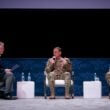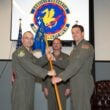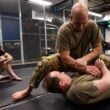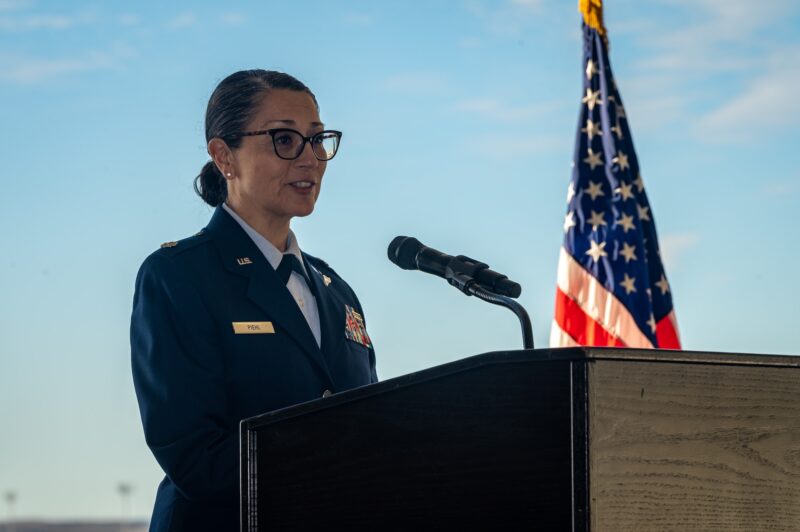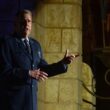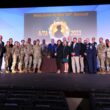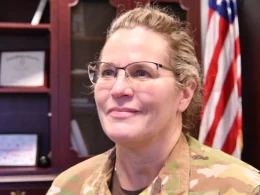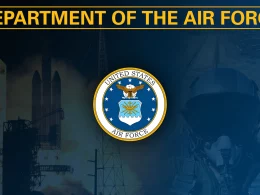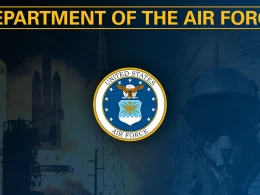TRAVIS AIR FORCE BASE, Calif. —
“I always knew that we were Native American. My maternal grandfather was 100% Navajo Indian. So naturally, I was always curious about my ancestry like a lot of people. I went online to Ancestry and submitted my sample. I started digging and learning more about my heritage,” said Lt. Col. Emma Piehl, commander of the 349th Air Medical Evacuation Squadron at Travis Air Force Base, California. She continues to embrace and learn more about her Native American Heritage.
This year marks 37 years of Air Force service for Piehl. “I joined as a reservist. Initially I wanted to be in the medical field. I wanted to be a nurse, like my mother and my grandmother,” she said. “Of course, the recruiter sent me off to be a jet engine mechanic. But several career changes later, I decided to go active duty.”
Piehl recently assumed command of the 349th AES. The Assumption of Command ceremony was held during this month’s Unit Training Assembly. It was at Travis AFB where she first crossed trained into the surgical technician career field. Her desire to be a nurse didn’t stop after technical training. Piehl continued to study to become a nurse. After she returned from a deployment, Piehl transferred to the 349th AES and took her place serving as a surgical nurse.
“After eight years of flying and the deployment as a flight nurse, I was recruited to the 349th Air Mobility Operations Squadron,” said Piehl. “There, I became the director of operations, and participated in many joint exercises in support of the active duty at the 613th Indo-Pacific Command headquarters at Joint Base Pearl Harbor-Hickam, Hawaii. (I) really loved my time there.”
Piehl was assigned to the 349th Air Mobility Wing inspector general’s office for almost two years before the opportunity to become the 349th AES commander presented itself.
“I am that kind of nurse. I love my patients. I love taking care of people, and I think that’s really helped me in my career in the Air Force,” said Piehl. “I love taking care of people and then some, not just as a commander but in any part of a unit. And that’s what we need more of.”
Growing up, Piehl had two strong role models who were nurses that lead her to finding her passion in life at a young age. She gives credit to her grandmother, who is of Native American and Mexican American descent, and her mother who preceded her in the nursing profession during a time when Native Americans were not welcomed.
She described her grandmother as hard working throughout her life.
“She used to tell me stories of how people would snub her and say, ‘You know, how do they let these people who are savages become nurses. They’re dirty people,’ ” Piehl said. “Then she would tell me that she would stand up at hearing this, smooth out her white nurse’s uniform and say, ‘Excuse me. I may be a savage. But I am not dirty.’ And she would walk away, and that’s how she dealt with that.”
The nursing career today is vastly diverse. Many people of every ethnicity hear a calling to this noble profession. Serving in the Air Force within the medical field is no different. Piehl said taking care of people in the military is a top priority. Airmen know they could deploy on a moment’s notice on top of the demands of weekend drills and temporary duty assignments.
“Integrity first. Service before self. Excellence in all we do. It is the same thing in the Native American culture; it doesn’t exclude anyone. It’s not in their DNA. And that’s what I love about today’s Air Force even more,” Piehl said. “The Air Force is taking deliberate steps to be inclusive of all, and it’s not just black and white, but various shades of brown and everything else in between.”
When Piehl’s mother heard the call to pursue the nursing profession, her mother faced many hurdles realizing her dream. She raised four children while putting herself through nursing school with no help and had to overcome the obstacles when she was looking for work to provide for her family.
“My grandmother and mother worked so hard. They just persevered until they found their calling. But really what stands out is not just that they were nurses, but they were always so compassionate,” she said. “People loved my mother and my grandmother. There’s always that one person in the family that everyone knows has that energy. My mother would care for people in the neighborhood. They may have been illegal immigrants, or they didn’t have money to go to a doctor, and she would go to their homes and help them when they were pregnant. They were too afraid to go to the hospital to deliver. I remember my grandmother going through the neighborhood and helping people who were sick.”
Piehl said while growing up she always felt she was an introvert, and in an observation mode, thinking she could never become a kind and compassionate nurse emulating her grandmother and mother.
Today, Piehl confidently says, “I am that kind of nurse. I love my patients. I love taking care of people, and I think that’s really helped me in my career in the Air Force.”



